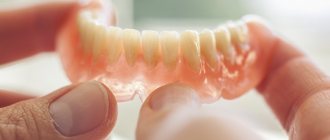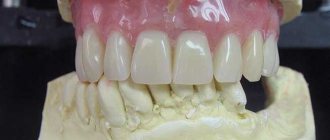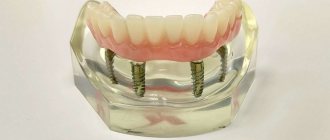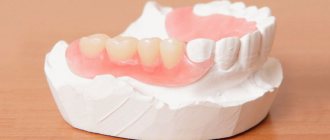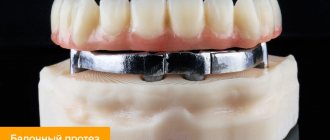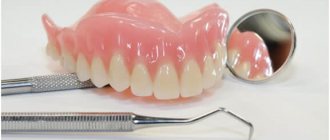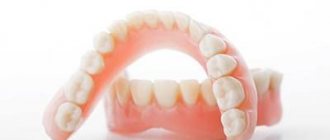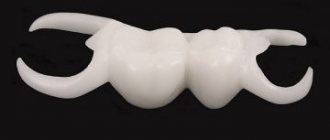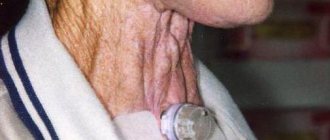What are removable silicone dentures?
Silicone prostheses are quite popular among the population. They are durable to wear and in their aesthetic appearance, due to their translucency, are close to natural teeth. The color can be matched to the color of the gums.
The silicone product is a base made of silicone. Artificial teeth are attached to it. However, they cannot exist positively for a long time. As a result, cracks appear. Pieces of food get stuck in these gaps between the artificial teeth and artificial gum. In it, parasitic bacteria multiply, which ultimately leads to disease.
Since this type of prosthesis lasts from one to one and a half years, experts suggest using it as a temporary one. The greatest effect is achieved on the teeth in the smile area. They are also good if there are no teeth on which the bridge is attached. In this case, the denture is connected to the gum with clasps.
Technical characteristics and properties
There is no metal present in a silicone product. Thanks to this, the product acquires natural shapes and colors. The product is quite compact. They are the best for those with a low-slung palate.
This type of prosthesis is perfect for those people who have allergic reactions to acrylic or metal. Installation occurs using clasps or adhesives. The products also have elasticity. This property of dentures helps to correctly distribute the load during chewing. The soft base resists various impacts, except impacts at right angles.
In all dental clinics, this type of prosthesis is presented in a huge assortment. Therefore, everyone who needs it can choose exactly the type that suits them personally. Advantages and disadvantages of silicone dentures
Read the intricacies of obtaining a tax deduction for dental prosthetics - who is entitled to benefits
Advantages:
- Elasticity.
- Good hold.
- Strength.
- Durability.
- Not subject to dyes.
- No need to grind the supporting teeth.
Flaws:
- Not desirable for prosthetics of the lower jaw, due to the inability to withstand heavy loads when chewing.
- Needs special cleaning products.
Life time
Silicone prostheses are quite durable. Characterized by resistance to dyes. The lifespan of a prosthesis with proper care is 5 years. If inspections are completed on time and used as intended, the period will be extended. If the product is damaged, contact your dentist immediately. Do not start repairing it yourself. This may make the situation worse.
Comparison of silicone structures with other types of removable dentures
To understand how silicone models differ from others, those with which they are confused or compared, see the summary table.
| Silicone | Acrylic | Nylon | Clasp | |
| What are they made of? | Base and hooks – silicone, teeth – plastic | Base – acrylic, teeth – plastic | Base – nylon, teeth – plastic | The base has a metal arch, the base is acrylic, the teeth are plastic, the hooks are metal |
| Fixation method | Hooks to abutment teeth | With hooks or by sucking on the mucous membrane | With hooks or by sucking on the mucous membrane | Hooks, locks, telescopic crowns |
| How many teeth are restored? | Used for partial or multiple edentia | Any quantity | Any quantity | Suitable only for partially edentulous patients |
| Possibility of developing allergies | Absent | High enough | Small | Quite high (for metals) |
| Lifetime | 1-1.5 years | 3-5 years | 2-4 years | 5-7 years |
| Price | From 20,000 rubles | From 15,000 rubles | From 20,000 rubles | From 35,000 rubles |
Silicone dentures are liked by most patients who have them installed, so reviews about them are mostly positive. The only thing that upsets patients is the prices for them, because they are quite high, especially considering the fact that the service life is short and the designs are only good as a temporary measure. How much do they cost? The cost starts from 20,000 rubles, but it can increase depending on the number of teeth being restored.
Notice
: Undefined variable: post_id in
/home/c/ch75405/public_html/wp-content/themes/UltraSmile/single-item.php
on line
45 Notice
: Undefined variable: full in
/home/c/ch75405/public_html/wp-content /themes/UltraSmile/single-item.php
on line
46
Rate this article:
( 3 ratings, average: 5.00 out of 5)
prosthetics
- Lebedenko I.Yu., Voronov A.P., Voronov I.A., Nasuev G.M. Studies of the sanitary-chemical and toxicological properties of the domestic silicone material of cold polymerization “Silast-M” for removable dentures. Saratov scientific and medical journal, 2014.
Expert “Silicone devices are fixed to the remaining teeth in the mouth using hooks, also made of base material. These hooks are quite soft, but over time they begin to injure the gum in the neck of the supporting tooth and lead to its exposure - this provokes the development of an inflammatory process and severe pain. In addition, silicone clasps are unable to evenly distribute the chewing load; they excessively load the supporting teeth, while the prosthesis itself puts pressure on the soft tissues of the prosthetic bed, which accelerates atrophic processes in the bone tissue of the jaw.” Dentist-therapist, orthopedist Litvinenko Olga Viktorovna
Consulting specialist
Bostanov Eldar Albertovich
Doctor rating: 9.5 from 10 (2) Specialization: Implant surgeon, Ph.D. Experience: 12 years
Indications and contraindications for the installation of silicone prostheses
In what cases is installation indicated:
- The presence of allergic reactions to acrylic and metals.
- Increased sensitivity to foreign objects.
- Diseases of the endocrine system. For example, diabetes mellitus, which is characterized by long-term non-healing of wounds.
- Bronchial asthma. Silicone does not cause attacks in asthmatics.
- Loss of teeth in childhood.
- Periodontal disease and periodontitis.
- If you have a profession that is characterized by an increased risk of mucosal damage.
- Diseases of the cardiovascular system.
In what cases is installation contraindicated:
- In case of atrophy and the presence of alveolar periodontitis
- Periodontal disease of the second degree.
- Pathology of the supporting processes.
- Diseases of the mucous membrane.
- Exposed tooth root.
Kinds
Silicone prostheses can be made in different types. The design of the products depends on the amount of replacement of missing units of the dentition.
The following types are distinguished:
- single;
- partial;
- full.
A single prosthesis has side clasps. These are peculiar hooks that are attached to the lower row of teeth. Partial dentures are attached in the same way.
But complete structures are used quite rarely, this is due to the fact that the material is highly susceptible to shrinkage, and it can also cause damage to natural dental units due to weak fixation.
Types of silicone prostheses
The emergence of new technologies in the casting of pressed polymers has given impetus to the emergence of new types of flexible and soft prostheses. This category includes silicone prostheses:
- Nylon.
- Akri fries.
- Quadrotti.
- Polyurethane.
- Acetal.
Silicone acetal prostheses
Clasp acetal dentures using silicone
Acetal is a type of plastic. It is lightweight but very durable. Practically does not erase. It is even used in mechanical engineering, where it replaces metal in the production of gears and bearings. This type of material does not enter into a chemical reaction with the human body. The melting point of acetal is 120 degrees. This suggests that using products made from this material you can drink very hot drinks.
Polyurethane silicone prostheses
This type of construction is an analogue of nylon products. Such dentures are very popular in dentistry. Their characteristics are similar to nylon products, but unlike them, they are cheaper. And in terms of elasticity and flexibility, they are even much better than nylon ones. Polyurethane dentures can withstand increased loads and temperatures.
Another positive quality of this material is its lack of reaction to moisture. No moisture is absorbed. Thanks to this, bacteria do not accumulate on the surface of the product, causing odor and inflammation.
There are no special contraindications for the installation of polyurethane prostheses. Except for one thing – the absence of a large number of teeth or their complete absence.
Silicone quadrotti prostheses
Quadrotti prosthetic technology was developed by the Italian company QuattroTi. They are characterized by increased comfort during use compared to other types of silicone prostheses. Used for the restoration of one or several teeth. They compete with nylon prostheses. Convenient, easy to use and at the same time more aesthetically pleasing.
Silicone dentures acry free
Acre fri is the name of the material that is used in the manufacture of prosthetics. There are no free monomers in it. In its original form, the material is presented in the form of granules, which are transformed into a dental product during heat treatment.
Read Zirconium dental crowns - indications for installation, prices and reviews
This type of prosthesis is used for the restoration of any number of teeth and even in their complete absence. This prosthesis is placed directly on the gum. It fits firmly to the gums and is held in place due to its elasticity. There is no need to use adhesive components.
Nylon silicone prostheses
A nylon denture is a nylon plate with ready-made teeth. It has the ability to transmit light, making it look like natural teeth. Crammers of the same material serve as fastenings. Used for 3-5 years.
This design on the teeth is invisible even close up. It is securely and securely attached. It occupies one of the first places in terms of fixation. Indispensable for those patients who are allergic to metal and acrylic. Quickly addictive. Diction is restored in a short period of time. For care, removal occurs without damaging the gums. Is there a difference between silicone and nylon prostheses?
Silicone and nylon prostheses are often confused. What is their difference:
- Different basis. In the first case it is silicone, in the second it is nylon.
- Different structure. Silicone is much softer than nylon.
- Different physical characteristics. Nylon can be subject to more stress.
- Different in use. More comfortable - silicone.
How to care for a silicone prosthesis
Silicone prostheses must be provided with special care. If you select the wrong cleaning products, the product may smell unpleasant and even change color. What is included in the care:
- Availability of special toothpaste and brush.
- Removing the prosthesis before going to bed.
- Protect from falling.
- Do not use hot water.
- Constant presence in water.
- Daily cleaning procedures.
- Cleaning teeth, gums, cheeks, tongue before use.
Dentures are very flexible, but at the same time durable
Silicone prostheses, or rather their base and fixing elements, are made of silicone, which is characterized by increased flexibility, elasticity and a certain degree of softness, which is why they are often compared or even confused with nylon. However, they are so durable and even somewhat rigid that for this reason they are confused with acrylic. But despite a number of positive similarities with the listed types of removable systems, silicone structures are partially free of their disadvantages. For example, unlike nylon ones, they do not deform under mechanical stress and distribute the chewing load more evenly. And unlike acrylic ones, they do not rub the mucous membrane and injure the soft tissues of the oral cavity to a lesser extent, and the process of getting used to them is faster.
Such prostheses are quite flexible and durable.
You need to understand that in nylon prostheses the base is made of nylon, in acrylic ones - from acrylic, and in silicone ones - from silicone, respectively. As for their comparison with clasp systems, silicone models also include fixing hooks or clasps, but again they are made not of metal, but of transparent silicone. In addition, silicone devices, despite their good strength, are unable to splint teeth loosened as a result of the development of periodontal tissue diseases.
Independent researchers have found that the material the base of the prosthesis is made of has a significant impact on the functionality of the structure and the level of comfort felt by the patient. The adverse effects of the base material (for example, acrylic) can be reduced by creating a two-layer base1, and in this regard, one of the most promising is silicone, which does not injure the mucous membrane and is non-toxic. Those. In the future, silicone can be combined with other materials to enhance the positive qualities of the prosthesis.
Photos before and after installation
***
***
installation of a quadrotti prosthesis - before and after photos
New generation dentures
New generation dentures – without palate . They are comfortable and durable, fixed to the supporting teeth. Various fastening methods are used:
- elements in the form of loops;
- telescopic fasteners;
- attachments.
If teeth are completely missing, preliminary implantation is performed.
New generation dentures
Advantages and disadvantages
The main advantages of removable dentures : convenience and safety. After installation, the patient quickly gets used to them. In this case, diction is not impaired and there is no unpleasant sensation of pressure on the soft tissue of the gums. They provide optimal distribution of chewing load, reducing the risk of rapid bone tissue atrophy.
The disadvantage of a removable denture without a palate is the high price. The service will cost more than installing standard plastic or nylon products. Constructions of this type can only be placed if there are supporting teeth.
Production and installation
To obtain a quality product you must:
- Conducting a preliminary examination and treatment of the remaining dentition.
- Taking impressions.
- Making a model of the jaw.
- Manufacturing of silicone prostheses.
After manufacturing, they begin to install the silicone structure. The installation process includes:
- Treating the product with an antiseptic.
- Placement in the oral cavity.
- Adjustment if necessary.
- Conducting care instructions.
The removable product is installed using silicone clasps. This is in the presence of supporting teeth. If they are not available, they resort to screws made of titanium material. The screws are screwed into the jaw itself. An artificial root is obtained, onto which a crown is subsequently installed or a prosthesis is attached.
Getting used to the design lasts one week. To speed up the addiction process, use special exercises recommended by your doctor.
Prices for installing silicone dentures
Taking into account all the negative aspects of silicone dentures, their cost is high. Throughout the country, the average cost is the same. The price can fluctuate between 30 -35 thousand rubles.
You can find cheaper ones, but you can’t vouch for their quality and durability.
Price
The price of silicone structures is quite high, considering all its disadvantages.
The cost of the structure is influenced by the quality of the silicone and the number of teeth being restored.
The price of structures made of high-quality silicone in different clinics across the country ranges from 30-35,000 rubles.
The cost of the prosthesis can be reduced by using cheaper silicone, but no self-respecting dentist will guarantee the quality of such a design.
| Type of prosthesis | Price, rub.) |
| Silicone design for the upper or lower jaw | from 30000 |
| Partial silicone denture | from 20000 |
| Design for 1-2 teeth made of silicone | from 15000 |
| Acrylic denture for the entire jaw | from 8000 |
| Partial acrylic denture | from 3000 |
| Full jaw nylon dental structure | from 25000 |
| Clasp prosthesis | from 18000 |
Reviews
Any feedback can be either positive or negative.
Let's look at the positive ones:
- Quite light. The volume is small compared to acrylic ones.
- Almost invisible in the oral cavity.
- Hypoallergenic.
Now comes the negative reviews:
- Flexibility characteristic of nylon products.
- As a result, painful sensations appear when chewing.
- Over the course of five years, jaw height decreases by 5 mm.
- The prosthesis sags.
- Injury to the gums.
- Food gets under the prosthesis.
Read Dental prosthetics plan - what does it look like and what is it for?
Advantages
The advantages of silicone prostheses include:
- The structure has high elasticity, which does not cause discomfort when using it. Photo: Removable silicone structures in the upper and lower jaws
- Ideal reproduction of the configuration of the palate, thanks to which the prosthesis fits perfectly to the gums, which speeds up the process of getting used to the sensation of a foreign body in the oral cavity.
- The denture is securely fixed in the mouth, which prevents it from falling out during chewing.
- Silicone structures are made of hypoallergenic material, which is important for those patients who are allergic to acrylic plastic or metal.
- Durability of the product and rational distribution of the chewing load on the jaws when chewing.
- No grinding of abutment teeth is required to secure the structure. This is an important factor that allows the patient to save his teeth.
- High aesthetic properties. The silicone prosthesis is practically invisible in the mouth, because... The retainers are made to match the color of the oral mucosa or the shade of natural teeth.
- Silicone is not colored with food dyes and retains its original color for a long time, due to the lack of hygroscopicity and homogeneity of the base material.
- The structures are devoid of rigidity and metal elements that can damage the gums and supporting teeth or cause them to loosen.
- Silicone products are almost impossible to break.
- Ease and simplicity of prosthesis care.
Not the eternal aesthetics of nylon prostheses
There is one more important point. The resulting aesthetics disappear after 1.5 years of wear. The denture becomes darker and feels rough to the touch.
This comes from the property of nylon to be poorly polished on the one hand, and on the other hand, the patient himself puts his hand to it. When cleaning the product, use abrasive pastes and brushes, and not special ones recommended by the doctor.
One more property of nylon needs to be taken into account. With constant chewing, it changes its optical properties. Tartar can also form at the interfaces between nylon and plastic. This occurs from the occurrence of microcracks.
Patient reviews of silicone removable dentures
Silicone removable dentures, reviews from many consumers, are characterized as good and high-quality products that can fully replace natural teeth. To understand whether this is true, it is worth considering several reviews.
Svetlana, 55 years old
“I’ve been wearing dentures for about 5 years, I lost my teeth early, but inserting implants is expensive for me, so I decided to use dentures. At first I wore acrylic products. Then, when the time came to change them, after about 3.5 years, the doctor recommended that I temporarily use silicone prostheses. They are very soft, comfortable, and do not rub. The main thing is that they are not noticeable when you smile, because all the clasps completely match the color of your teeth and gums.”
Leonid, 37 years old
“During the fight, my two front teeth, which are in plain sight, were knocked out. The placement is quite expensive, and it is not possible due to indications (periodontal disease). For this reason, the dentist recommended a partial denture made of silicone.
The doctor told me about all the features and advantages of this product. I agreed without hesitation. I’ve been wearing it for 7 months now, I like everything – it’s comfortable, beautiful and no unpleasant sensations.”
Find out about the treatment of chemical burns to the oral mucosa.
Symptoms and treatment of stomatitis in children. Follow the link.
Rules of care
In order for the prosthesis to serve for a long time and flawlessly, you need to apply basic rules of care. It's not difficult to follow the rules. They were developed directly for this type of construction.
What you need to buy: a soft special brush, liquid soap, cleaning product in tablets.
Toothpaste is not suitable for cleaning as it contains abrasive particles that can scratch the product. Never use bleach or hot water. This can completely ruin the design.
Clean twice a day. For this purpose, the denture is placed in an introductory solution with a cleaning tablet. Leave in it for 10 minutes. Then begin brushing. Rinse. After eating, remove and rinse in clean water.
At night, place the product in a disinfectant solution.
If you follow these simple rules, the prosthesis will retain its color and shape for a long time. Otherwise, bacteria can multiply on it and cause an infectious disease of the oral cavity.
Product cost
Prices for silicone products do not differ much in different clinics.
The cost of a partially removable denture ranges from 26 to 40 thousand rubles. Completely removable denture – 32-45 thousand rubles. Single denture for 1-2 teeth – 18-20 thousand rubles. Patient reviews
- I have been wearing silicone dentures on my front teeth for two years now. I adapted to it quickly. I grind the solid component of food before chewing. Very high maintenance.
- I used this type of design because I didn’t want to go through turning. In principle, everything suits me. But there is one thing, but pain appears when chewing.
- I got a prosthesis a few months ago. There is already an unpleasant smell. I did not take into account the doctor’s recommendations for caring for the product. I spent a lot of money on the prosthesis itself, now I need money for special pastes and brushes.
- I have a denture on one front tooth. My friends don’t even know about it, since it’s practically invisible. I experience discomfort when chewing, but otherwise everything is fine.
Stock
-11%
Segment of chewing teeth with prosthesis on day 3 135,000 rub.
120,000 rub.
get -16 %
Premium implantation Nobel and zirconium dioxide crown 125,000 rub.
105,000 rub.
get -19 %
German implants XIVE Friadent 80,000 rub.
65,000 rub.
get -40 %
Teeth whitening Amazing White 10,000 rub.
6000 rub. get
Advantages and disadvantages
These are highly aesthetic products that are practically invisible in the oral cavity. Their flexible part is translucent and painted in different shades of pink, thanks to which it merges with the mucous membrane. Silicone devices have the following advantages:
- Small volume and weight. This is how they differ from acrylic structures, which have a heavy frame of considerable thickness. The silicone base is 10 times stronger than acrylic or plastic. With the same characteristics, silicone products weigh much less than plastic ones and are highly comfortable.
- There is no need to grind adjacent teeth for installation. Like plastic dentures, silicone ones are fixed with clasps. But if the fastenings of the former are made of metal and are clearly visible when you smile, then for the latter they are made of translucent material. The clasps do not cover the teeth themselves, but the gums around them, so they are practically invisible.
- Reliability. The product is firmly attached to the mouth and does not fall out under any circumstances.
- Hypoallergenic. Unlike acrylic, silicone dental prostheses do not contain monomers that cause allergies.
But there are not only positive qualities, but also some disadvantages. Removable silicone dentures have the following disadvantages:
- The products are fixed using clasps, which can cause injury to the mucous membranes and subsidence of the gums.
- Since on one side of the jaw the prosthesis puts pressure on the mucous membrane and puts pressure on it, atrophic changes in the bone tissue can occur. But if the prosthesis is placed on one or two teeth, then such consequences are unlikely.
- Dentures cannot bear prolonged chewing loads, so many experts do not recommend placing them on the lower jaw.
- High price. Compared to its acrylic counterpart, silicone dentures cost up to 5 times more.
- It takes a long time to get used to wearing it.
- You will have to visit the dentist often, since the prosthesis cannot be polished, and its surface is rough; bacteria settle on it, causing plaque and an unpleasant odor. Plaque can only be removed in a clinical setting.
- The service life of the prosthesis is short.
Another negative property is associated with their softness. Thus, with acrylic and clasp devices that have a rigid frame, the load on the gums is distributed evenly, even if a person bites off food on one side of the jaw. But silicone structures sag where the pressure is highest. Therefore, when chewing food, there is a strong load on certain areas of the gums. Because of this, the following negative changes occur in the jaw bones:
- Rapid loss of bone tissue volume, which can decrease by 5 mm over 5 years;
- Subsidence of certain places of the gums;
- Injury to tissue under the prosthesis;
- Pain when chewing food;
- Pieces of food getting under the denture.
- Due to subsidence of gum tissue, the design has to be changed frequently.
The use of silicone jaw replacements is not recommended when it comes to complete restoration of the dentition. But if no more than two teeth are replaced in this way, then problems will not arise.
The disadvantages of silicone dental structures are also associated with the characteristics of the material. Their disadvantages:
- The base has some roughness, and bacteria settle on its surface. They form a hard coating that has to be cleaned frequently. You cannot do this yourself; only a dentist can completely clean the product.
- Bad breath may occur due to insufficient cleaning or using the wrong cleanser.
- Clasps can injure the gums and cause the soft tissues to recede.
- Dentures do not withstand chewing load well, which is why they are rarely installed on the lower jaw.
- Silicone tends to absorb various odors, which are then difficult to get rid of.
- The products have a high cost, exceeding the price of plastic prostheses by 4-5 times.
- Short service life, usually 1−1.5 years. After this, the prosthesis darkens and becomes rough. It has to be replaced.
